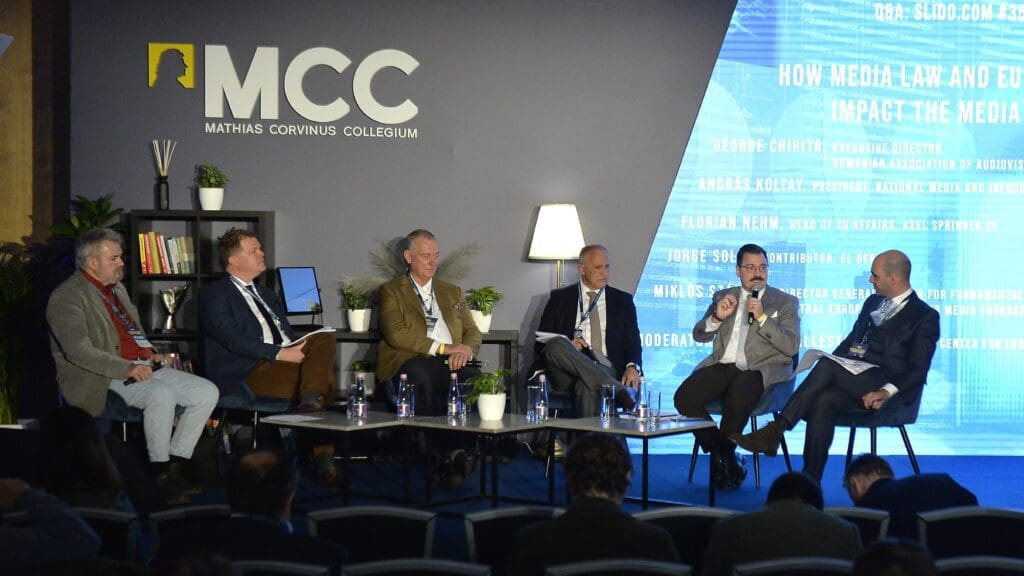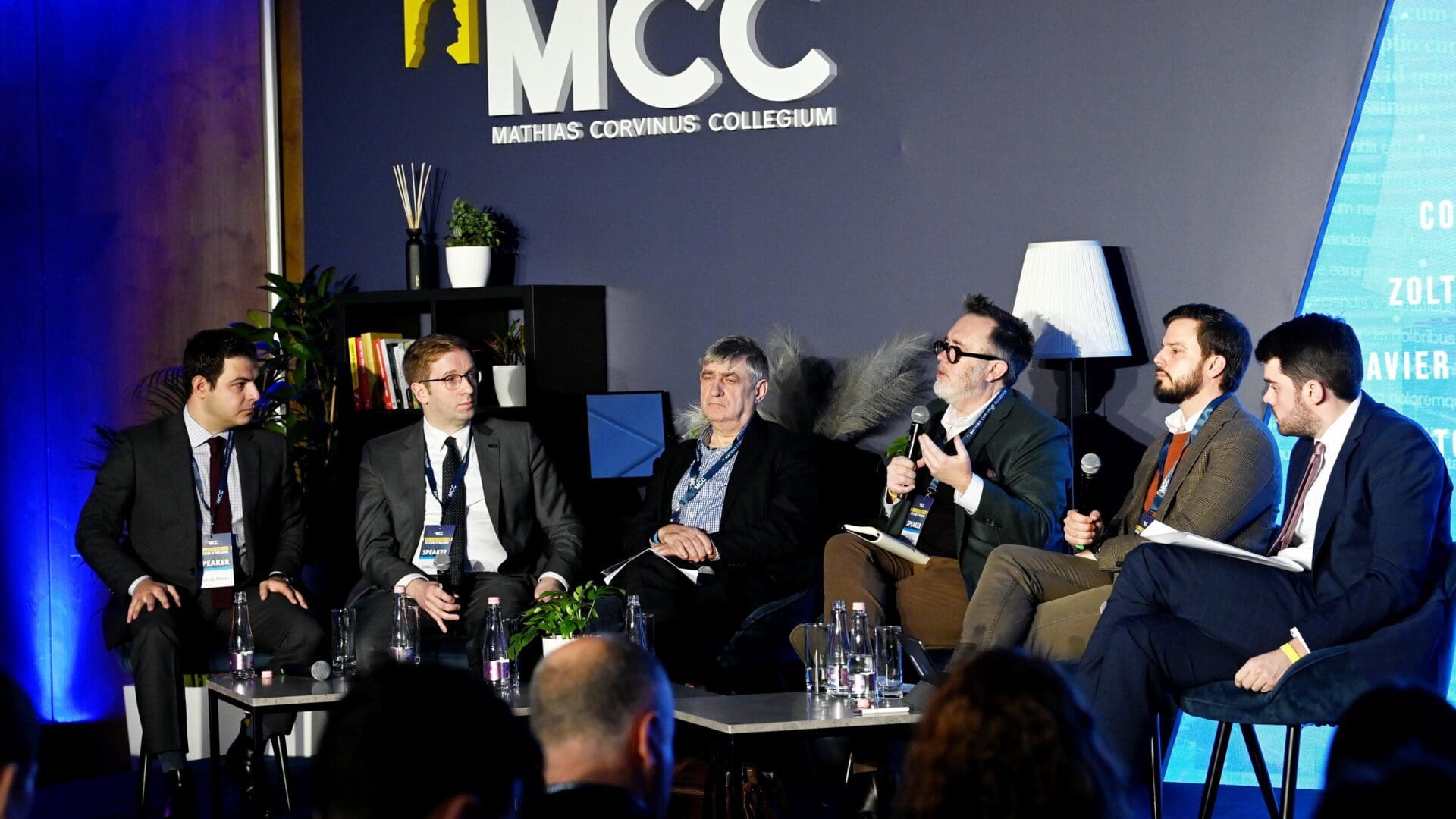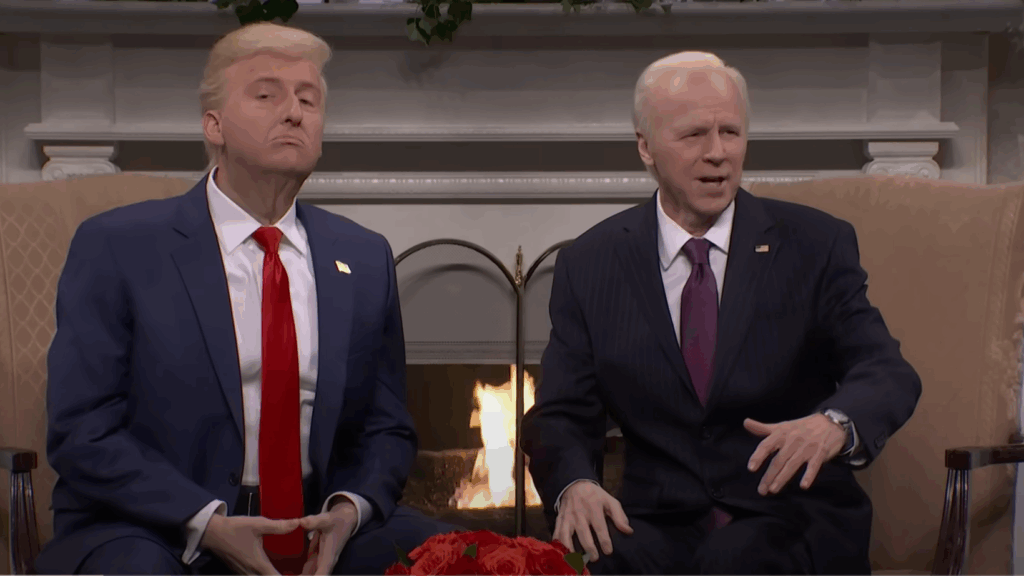The Future of Publishing Conference organised by Mathias Corvinus Collegium kicked off on a Wednesday morning, 25 January 2023. The venue was the MCC campus located near the Feneketlen tó (Bottomless Lake) in a pretty spot of Buda.
Before the first panellists took the stage, MCC Director General Zoltán Szalai and MCC Chairman of the Board of Trustees Balázs Orbán greeted the packed house of attendees with short speeches. Szalai emphasised the beauty and influence of the Hungarian language, before briefly outlining the main topic all discussions would be centred around for the two days of the conference: the changing media landscape. Orbán stressed that media is a question of national sovereignty. Continuing with this line of thought, he shared the good news that today, over 50 per cent of Hungarian media is under Hungarian ownership. During the Gyurcsány-Bajnai administration, the same figure was a mere 24 per cent.
After the short introductory speeches, the five panellists of the first discussion titled ‘New Formats: Media Revolutionaries’ took the stage. They were: Sohrab Ahmari, the founder and editor of Compact Magazine; Rod Dreher, the senior editor of The American Conservative; Colin Morrison, the founder and publisher of Flashes & Flames Media Ltd; Zoltán Szalai, who is also the managing director of Mandiner; and Javier Villamor, a journalist for 7NN. Moderated by Mindset Psychology founder Bence Arany, the conversation was about how the business models and trends changed for media companies in the digital age.
Ahrami described the new media landscape as ‘fractured’ and emphasised the impact of the major dip in advertising revenue in the 2000s. As a result, big publications have to rely on the subscription model more, as his own Compact Magazine does, inspired by the crowdfunding efforts of the ‘individual brand journalists’. Mr Morrison, on the other hand, said he does not see this necessarily as a bad thing. In pursuit of more ad revenue, publishers were forced to push the circulation to as high as they could, often to the detriment of quality. He reminded of the advertisement boom publishers experienced in the West, from the 1960s up until the 2000s.
Mr Dreher recalled his start in the media industry in the 1980s in the US. Then, the media was much more centralised, and the public had a lot more trust in the mainstream press than today. Reflecting on his time at the Dallas Morning News in the mid-2000s, he described a strange phenomenon he witnessed there. He had the feeling that the editorial and news staff hated their own audience, given that the Dallas paper’s readership was largely white, Christian, and Republican. He believes this condescending attitude still prevails among journalists, especially towards conservatives.
The leftist slant of the mainstream media was a common topic of the day, not just in this discussion. Mr Villamor from Spain went as far as drawing a parallel between news published in the time of General Franco’s fascist regime, and the news put out by major outlets in his home country today. He was referring to the opinion of his mother, who always taught him to ‘read between the lines’ when reading the news. Back to Mr Dreher, he lamented the fact that while most people in high management at the biggest news and entertainment companies claim to be champions of diversity, they do not extend their principles to diversity of thought and opinions, only to superficial characteristics such as race and gender. The people they hire tend to be educated in the same places and think the same way, even if they look different. Mr Szalay reflected on an earlier topic of advertising vs. subscription revenue, and he opined that he prefers it when the readers have a bigger influence on his publications than the advertisers.
Around noon, a line-up of five new panellists claimed the floor. George Chirita, the Executive Director of the Romanian Association of Audiovisual Communications; András Koltay, the President of the National Media and Infocommunications Authority; Florian Nehm, Head of EU Affairs at Axel Springer SE; Jorge Soley, a contributor for El Debate; and Miklós Szánthó, Director General for the Center for Fundamental Rights. Rodrigo Ballester, Head of the Centre for European Studies at MCC, took on the role of the moderator.

The new media regulations implemented by the Union to give publishers more tools to collect royalties on their copyrighted material were viewed rather favourably by the panel. They were mostly in agreement also about the fact hat social media companies and news aggregator sites are syphon away ad revenue from the news outlets making the actual effort on reporting. However, Mr Koltay, Mr Szánthó, and Mr Soley expressed their doubts about another new set of rules, the so-called Media Freedom Act, a proposal that has already been approved by the European Commission. The panellists concurred that it is an attempted power grab by Brussels to influence the media in their member states, something that they should have no authority to do. Mr Koltay stated that he believes the Hungarian government is officially against the measure, and will try to block it from taking effect.
On a different note, Mr Szánthó talked about what he believes is the biggest threat to freedom of speech: the neo-Marxist ‘wokeness’, and their modus operandi, ‘cancel culture’. Mr Soley shed light on a problem in his home country of Spain. There, according to him, local governments give out huge subsidies to media outlets that are biased towards the right-wing parties in power.
However, his claims were disputed by Mr Nehm, leading to some unusual tension between the panellists on stage, including Nehm also suggesting there is no such thing as wokeness in the media.
Day one of the conference concluded with a discussion titled ‘Back to the Roots: Credible, Longform Publishing’. Alvino-Mario Fantini, editor-in-chief and publisher of The European Conservative; Jean Sébastien Ferjou, Founder and Publisher of Atlantico.fr; David Jones, the Director of research at Danube Institute; and Alexander Marguier, editor-in-chief of Cicero and Res Publica Verlags GmbH were on stage for this panel. It was moderated by renowned Hungarian British author and commentator Tibor Fischer, who is currently head of the Centre for Literature at MCC.
The first challenge for the speakers was to give an exact range of word count for a longform essay that would still make it an enjoyable read. The problem was for Mr Fantini that his online publication, while focusing on long essays, has published book reviews as short as just 100 words. The longest piece ever released there was 6,000 words. Soon, however, the panellists arrived at an agreement that an op-ed piece usually runs around 1,000 words while a longform essay is at least 2,500 words. They also discussed the origin of the essay format. We learned that it originates from Mr Ferjou’s home country, France, with Michel de Montaigne’s work from the 16th century. The word itself is derived from the French ‘l’essai’, meaning a trial.
All panellists also shared the opinion that younger audiences tend to have shorter attention spans, which is evidently a problem for the long written format. Mr Ferjou confessed that it is also a problem for him—he cannot even finish a film in one sitting at home, only at a cinema. However, the panellists were reminded by a question from the audience about the popularity of podcasts, some of which can run for up to 3–4 hours. The speakers then agreed that longform is a better fit for audio media, such as podcasts and audiobooks, rather than for the written format.








